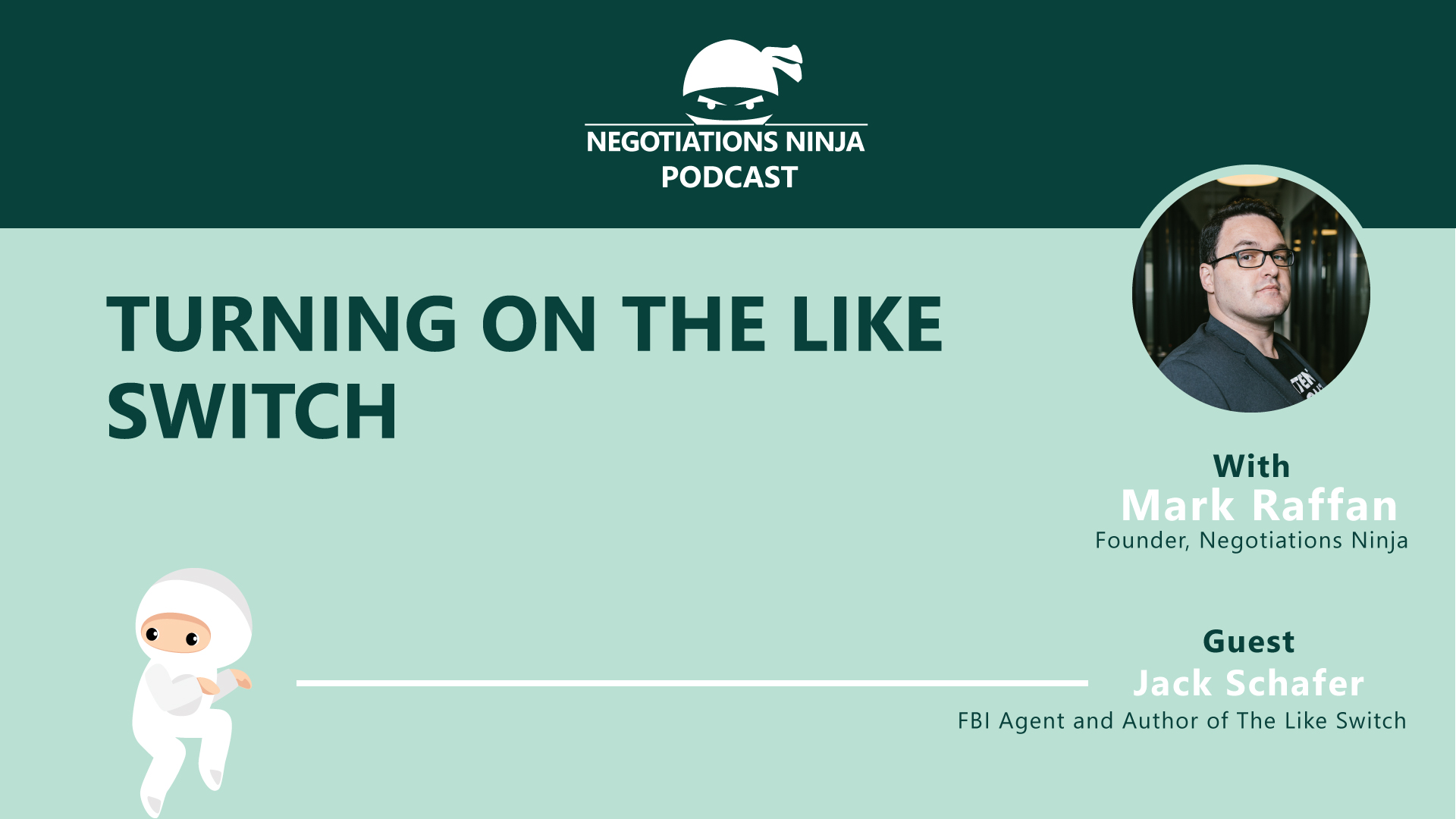How can we create situations to elicit more information from someone where they don’t even realize they’re giving away that information? For the longest time, that was Jack Schafer’s job at the FBI as a behavioral analyst.
Through years of experience turning foreign agents into informants, he built up a unique skill set. Through the use of certain behavioral techniques and cues, Jack teaches us how to gain and leverage trust to our benefit. Listen to this episode of Negotiations Ninja to learn how to turn on “The Like Switch.”
Outline of This Episode
- [2:21] Learn more about Jack Schafer
- [3:37] The most common weaknesses Jack sees
- [5:32] How to keep a relationship interesting and novel
- [9:56] Jack’s strategy to turn foreign agents
- [14:29] How to shortcut the friendship formula
- [19:13] Strategies to test for good rapport
- [22:13] Using empathic statements to reduce tension
- [28:53] How to use presumptive statements to elicit information
- [34:01] The biggest communication failure Jack has seen
Using the “Like Switch” to turn foreign agents
To recruit a specific foreign intelligence officer, Jack has his agent employ part of the friendship formula: Proximity. They had their agent simply be present in the same space as their target. Why? Because the more you see someone, the more comfortable you get.
The agent also sent signals to that person that he wasn’t a danger or threat. How? By using the three basic “friend” signals:
- The eyebrow flash: This is a quick up and down movement of the eyebrows that tells the person that you aren’t a threat. When that person sees you do this, they typically “flash” back.
- The head-tilt: This exposes your carotid artery, which displays vulnerability. It lets them know you aren’t afraid of them.
- Smile (and get the other person to smile): When someone smiles, it gives them a shot of endorphins, which makes them feel good about themselves.
The agent used these signals to build up to meeting the target for the first time. After several months, the agent approached the target and wasn’t perceived as a threat. He introduced himself, and the target said, “What took you so long?”
Their preparation to get their agent to meet a hostile intelligence service officer and at least have an opportunity to talk without his sense of “fight or flight” being triggered worked.
How to keep a relationship interesting and novel
When we get into new relationships, we tend to “data dump” everything we know about ourselves to impress the other person. But as you go along in the relationship, you’ve already told them everything important, and there’s nothing “new” left. That’s a problem.
Relationships last longer and grow deeper when you constantly unfold new things about someone. So instead of data dumping, throw crumbs here and there about who you are to keep the relationship interesting and novel.
Secondly, the golden rule of friendship states that if you want people to like you, you have to make them feel good about themselves. When you meet someone for the first time, you want to use “empathic statements.” Empathic statements let others know that you’re truly interested in them and what they’re saying.
An empathic statement must start with “So you…” Why? It keeps the focus on them. Then, you take what they’re feeling and use parallel language to mirror it back to them. They’ll acknowledge that you’re right—or wrong—and usually provide additional information. They’ll like you because they feel like you listened to them, which is more impressive than sharing your accolades.
Strategies to test for good rapport
When you first meet someone, you want to mirror them to let them know you’re in good rapport. If you want to test for rapport, you employ “lead and follow.” Uncross your arms and take a new position. That person should mirror your new stance or display if you’re in good rapport.
What else can you do to build and test rapport? Go somewhere where you can eat or drink something. Why? Pay for whatever is served to create reciprocity. If you buy their dinner, they’ll feel the need to give you something back, even if it’s as simple as conversation or attention. Secondly, 70% of all information is exchanged over food or drink.
So how do you tell if you’ve built a rapport over a meal? If you’re having coffee with someone, and that person places the cup between the two of you, you know rapport hasn’t been established. If they place the cup to the side, they’ve removed the barrier, and you’re in good rapport.
How can you use presumptive statements to elicit information? How do you develop rapport quickly? Listen to the whole episode to learn how to turn on the like switch in your relationships.
Resources & People Mentioned
Connect with Jack Schafer
Connect With Mark
- Follow Negotiations Ninja on Twitter: @NegotiationPod
- Connect with Mark on LinkedIn
- Follow Negotiations Ninja on LinkedIn
- Connect on Instagram: @NegotiationPod




